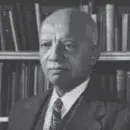
Carter G. Woodson
Carter G. Woodson was a historian, journalist, and the founder of the Association for the Study of African American Life and History (ASALH). He was one of the first scholars to study the history of the African diaspora, including African American history. Woodson was an influential figure in the Afrocentrism movement, placing people of African descent at the center of the study of history and the human experience. He was educated at Berea College (B.A., 1903), the University of Chicago (B.A., M.A., 1908), and Harvard University (Ph.D., 1912). He was the second Black American to receive a doctorate from Harvard, and the only person of enslaved parents to earn a Ph.D. in history from any U.S. institution.
Woodson taught at Howard University and West Virginia Collegiate Institute (now West Virginia State University). He founded the Association for the Study of Negro Life and History (now ASALH) in 1915, citing the American Historical Association’s practice of meeting in segregated hotels (effectively barring him from participating in conferences) and the white-dominated historical profession’s lack of interest in Black history. In 1916, he started the Journal of Negro History (today the Journal of African American History). In 1919–1920, he served as dean of the College of Liberal Arts at Howard University, and from 1920–1922 he was dean at West Virginia Collegiate Institute. While in West Virginia, he also founded and became president of Associated Publishers, a publishing company that produced books on Black life and culture.
Woodson’s publications include A Century of Negro Migration (1918), The Education of the Negro Prior to 1861 (1919), The History of the Negro Church (1921), and The Negro in Our History (1922). In 1926, he launched the celebration of “Negro History Week,” the precursor of Black History Month.